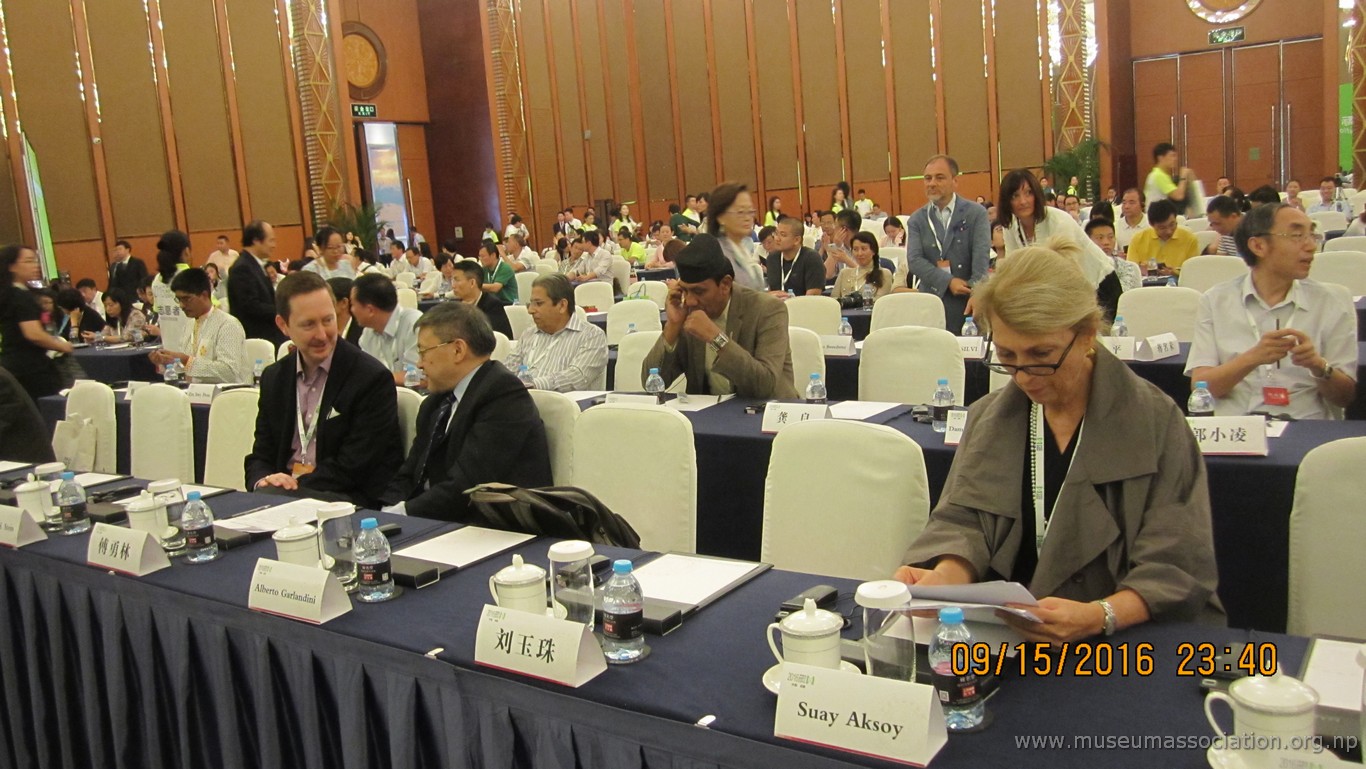

MPT Expo, Chengdu
Dr Prem Singh Basnyat - Chairman: Nepal Museum Association participated the MPT Expo, Chengdu as ICOM - Nepal's representative
Successful mission to Chengdu for ICOM President
ICOM President Suay Aksoy was invited to give a lecture at the Keynote Forum on Silk Road Museum and Cooperation. She presented ICOM’s main activities and future goals.
One of the most important museum forums in China, the seventh edition of the Museums and Relevant Products and Technologies Exposition (MPT-EXPO) was held in Chengdu, China, from 14 to 19 September, 2016. Organised by the Chinese government and held every two years, the MPT-EXPO is the preeminent fair for museum professionals and related industries in China. It provides a platform for Chinese and international museums to understand the state of the museum industry, both domestically and globally, and to engage with hundreds of Chinese museums as well as buyers and suppliers of museum industry-related products and technologies. The MPT-EXPO also provides a platform to boost and encourage academic, educational and exhibition exchanges between Chinese and international museums and within the museum industry. Over 300 museums and cultural organisations from China and abroad participated, alongside some 400 museum technology and service providers.
The newly-elected ICOM President, Suay Aksoy, as well as ICOM Vice-Presidents, Alberto Garlandini and Laishun An, were invited to participate actively in this year’s edition. During the Opening Ceremony, ICOM President Suay Aksoy participated alongside the Director General of the State Administration of Cultural Heritage (SACH) and the Governor of the Sichuan Province. She delivered words of welcome, reaffirming that ICOM “has always had a strong relationship with China”, explaining that “our bonds with MPT-EXPO have been there since it was established back in 2004. ICOM has offered its sustainable support to this important event for the international museum sectors and relevant disciplines…with much appreciation for MPT-EXPO’s approach.” She recalled the importance of the ICOM General Conference in Shanghai in 2010 and the 2013 creation of the International Training Center in Beijing jointly with the Palace Museum, ICOM China and the Chinese Museums Association.
During the MPT-EXPO, the sixth meeting of the Member Representatives of the Chinese Museums Association was held. Other specialised committees and membership organisations under the Chinese Museums Association also held a series of lectures, forums and project promotional events.
At the expo site, an area was dedicated to on-site forums, lectures, seminars and academic exchanges, as well as a public activity area for on-site programme marketing events, performances, and signing ceremonies. ICOM President Suay Aksoy was invited to give a lecture at the Keynote Forum on Silk Road Museum and Cooperation. She presented ICOM’s main activities and future goals. During her speech, she highlighted the recent changes in the role of museums in our societies: “Today when we look around, we see that museums are places of reconciliation as much as they are of collecting or education. […] They are places of discussion and debate where the issues can be the environment, old age and urban regeneration. Museums are places of inclusion [and]…of exhibiting [alike]. And in our day inclusion has [undoubtedly] acquired a richer content. We often see exhibitions about migration, for example, which are developed and even realised with the participation of the migrants themselves. But what I found quite remarkable this year was the attempt by museums to motivate and include the Syrian refugees in the restoration of cultural heritage originating from their country. Museums are getting more innovative with their exhibitions as well as with the scope of their participative practice by the day.”
She then focused on the ICOM tools that have been developed since its creation, such as the ICOM Code of Ethics for Museums and the ICOM Emergency Red Lists programmes, and presented the ICOM International Training Centre in Beijing as a new step, signalling a new orientation in ICOM’s future plans.” She added: “We are proud of the performance of the International Training Centre and we would be happy to see its branches spread to other cities in China where they could serve the specific needs of the museums and heritage sites in their respective regions. Capacity-building is a major aspect of our commitment to professionalism, which is one of the three pillars of ICOM’s strategic vision and values. In the near future we hope our training activities culminate in ICOM publications and reach broader audiences.” She concluded her speech by recalling the independent status of ICOM, as an NGO that advocates independently for the heritage of humanity, and in particular, for museums and museum work. “This is why ICOM is recognised as the ultimate authority whose members, staff and affiliates work solely for the benefit of that heritage, cultural and natural, tangible and intangible […].”
